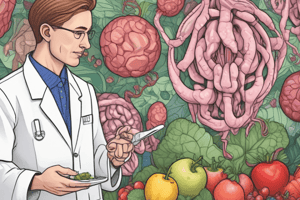Podcast
Questions and Answers
What is the primary cause of malnutrition in people with cancer?
What is the primary cause of malnutrition in people with cancer?
- Anorexia (correct)
- Tumor growth
- Impaired nutrient absorption
- Cachexia
Which of the following cancer treatments does not affect nutrition?
Which of the following cancer treatments does not affect nutrition?
- Immunotherapy
- Radiation therapy
- Physical therapy (correct)
- Surgery
What is the result of malnutrition in people with cancer?
What is the result of malnutrition in people with cancer?
- Improved immune function
- Weight gain and improved appetite
- Weakness, fatigue, and decreased quality of life (correct)
- Increased energy and strength
Which of the following tumors is most likely to cause malnutrition?
Which of the following tumors is most likely to cause malnutrition?
What is the effect of cancer on the body's use of nutrients?
What is the effect of cancer on the body's use of nutrients?
What is the main difference between anorexia and cachexia?
What is the main difference between anorexia and cachexia?
Which of the following is a symptom of malnutrition in people with cancer?
Which of the following is a symptom of malnutrition in people with cancer?
What is the effect of tumor growth on nutrition?
What is the effect of tumor growth on nutrition?
Which of the following cancer treatments is most likely to cause malnutrition?
Which of the following cancer treatments is most likely to cause malnutrition?
What is the consequence of malnutrition in people with cancer?
What is the consequence of malnutrition in people with cancer?
Flashcards are hidden until you start studying
Study Notes
Cancer and Nutrition
- Cancer and its treatments can affect nutrition, particularly when tumors involve the head, neck, esophagus, stomach, intestines, pancreas, or liver.
- Cancer treatments that can impact nutrition include chemotherapy, hormone therapy, radiation therapy, surgery, immunotherapy, and stem cell transplant.
Malnutrition and Cancer
- Cancer and its treatments can cause malnutrition, a condition resulting from a lack of key nutrients.
- Malnutrition can cause weakness, fatigue, and an impaired ability to fight infection or complete cancer treatment.
- Malnutrition can decrease quality of life and become life-threatening if left untreated.
Anorexia and Cachexia
- Anorexia is the loss of appetite or desire to eat and is a common symptom of cancer, often leading to malnutrition.
- Cachexia is a condition marked by weakness, weight loss, and fat and muscle loss, often seen in people with tumors affecting eating and digestion.
- Cachexia can occur even if a person is eating well, but the body is unable to store fat and muscle due to tumor growth.
- Some tumors can change the way the body uses certain nutrients, affecting protein, carbohydrate, and fat absorption.
Cachexia and Anorexia Syndrome (CAS)
- CAS is a condition characterized by weight loss and decreased lean body mass, often seen in people with advanced cancer.
- Treating high-risk patients to prevent CAS may lead to better outcomes.
- Olanzapine, a drug used to treat mental disorders, has been studied for its potential in treating CAS, but more clinical trials are needed to develop effective therapies.
Studying That Suits You
Use AI to generate personalized quizzes and flashcards to suit your learning preferences.




